Anything I'm obsessed with I'll post about on here—whether that be books, poems, movies, or Robert Sean Leonard.
Don't wanna be here? Send us removal request.
Photo
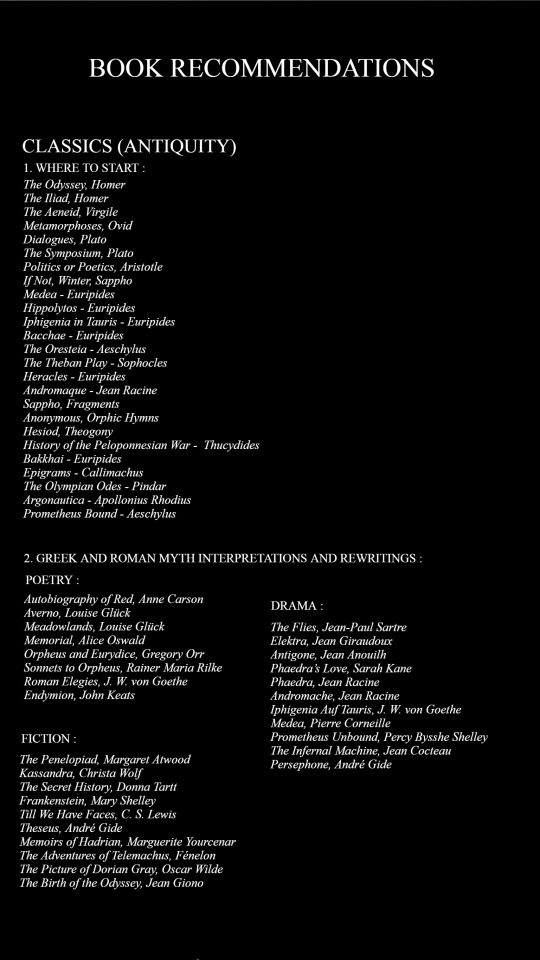
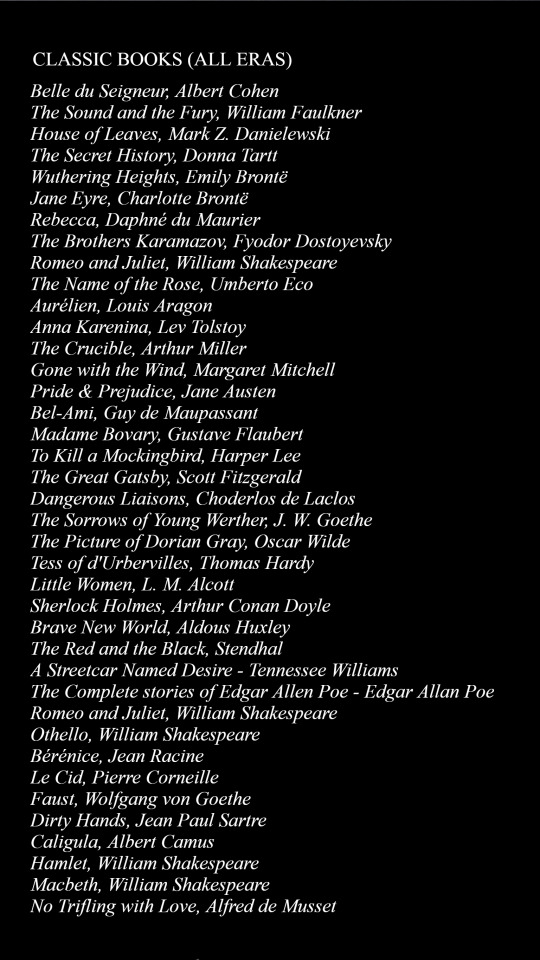
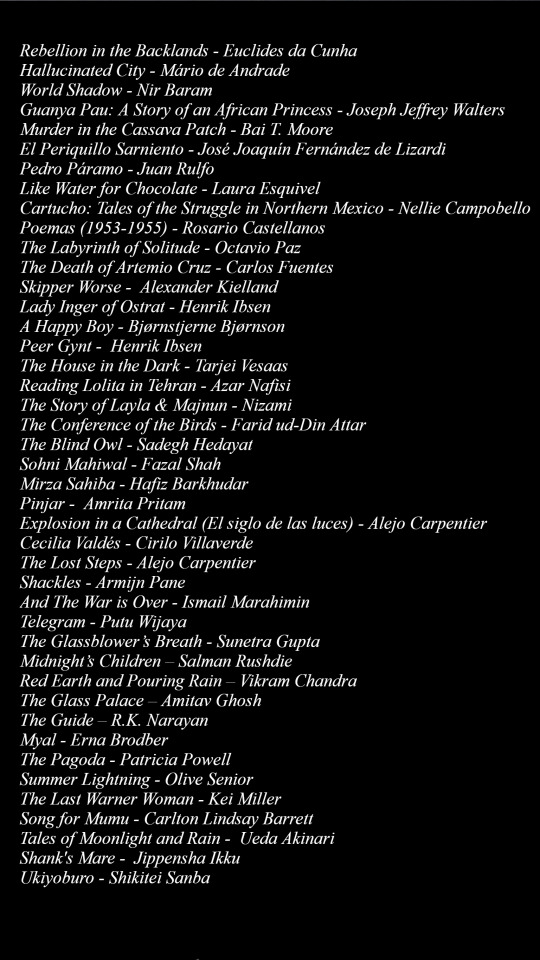
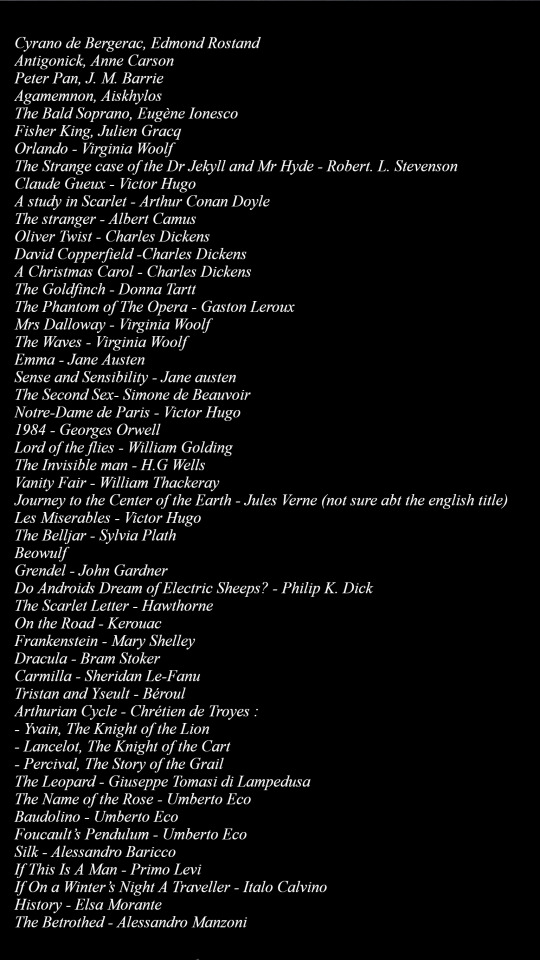
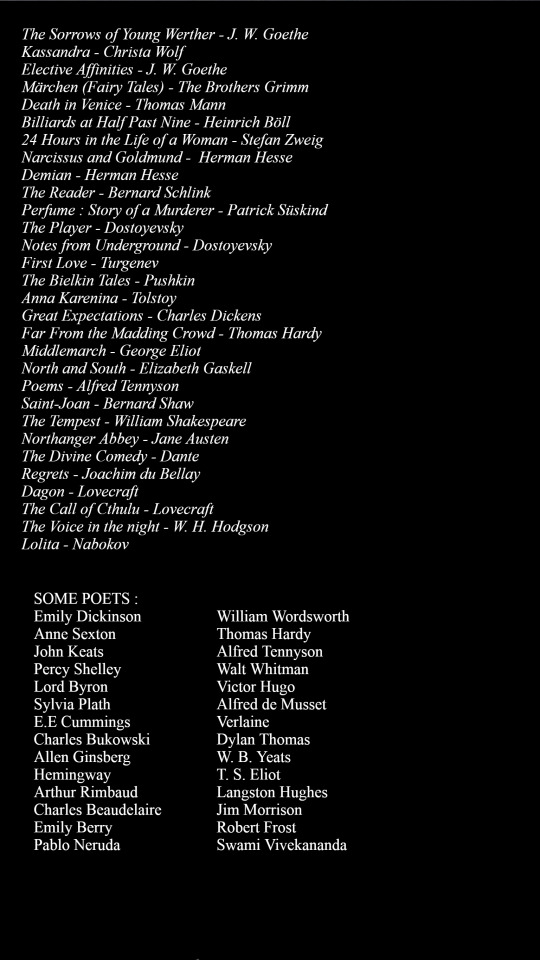
If you feel like you’ve seen this alread, that’s normal. This list of recommendation has been previously posted on my first account @praestantias which has been deleted for some reasons. So here I am, reposting it.
Hating how elitist and eurocentric the dark academia community became, I would truly appreciate that you leave some recommendation of book written by people of color, for I noticed that I am guilty of the eurocentric part, but I am really want to educate myself and read more non-white books.
Thank you for your suggestions!
38K notes
·
View notes
Text
Masterpost of Websites So I Don’t Lose Them
Website for finding random useful websites: https://usefulinterweb.com/
Wayback Machine: http://web.archive.org/save/https://limyaael.livejournal.com/521943.html
https://learn-anything.xyz/
Languages:
Free FSI Language Courses: https://www.fsi-language-courses.org/
Learn Japanese for Free Course: https://marshallyin.com/
Japanese again: https://sites.google.com/view/jo-mako/home
Japanese Dictionary: https://jisho.org/
Spanish Thesaurus: http://www.sinonimos.com/
Writing:
What to do in the middle of novels: https://limyaael.livejournal.com/521943.html
TVTropes: https://tvtropes.org/
http://www.dailywritingtips.com/
My favorite magazine: https://believermag.com/
List of the greatest books: https://thegreatestbooks.org/
Fantastic writing checker: https://hemingwayapp.com/
Brandon Sanderson Playlist of Lectures on Creative Writing: https://youtube.com/playlist?list=PLH3mK1NZn9QqOSj3ObrP3xL8tEJQ12-vL
Art:
https://drawabox.com/
Trivia:
Timeline Trivia Game: https://wikitrivia.tomjwatson.com/
Trivia Site: https://www.sporcle.com/
Geography Site #1: https://online.seterra.com/en
Geography Site #2: https://lizardpoint.com/
Useful Lists to Study (Quiz Bowl): https://sites.google.com/a/pgcps.org/erhs-it-s-academic/lists
Quiz Bowl Forums: https://www.hsquizbowl.org/forums/index.php?sid=e4e880fcbf3616f9d4fe003947908c74
Useful Apps:
Free virtual, nested whiteboard: https://museapp.com/
Favorite Masterposts:
https://sprouht-studies.tumblr.com/post/634810070929227776/areistotle-yooo-its-me-again-with-part-two-of
https://dark-academia-tips.tumblr.com/
Misc:
Write a letter to your future self: https://www.futureme.org/
I don’t know how to code or anything but I love the concept for this; a hacking practice site: https://overthewire.org/wargames/
https://easylang.online/apps/tutorial_learn_programming.html
Interactive Fiction Database: https://ifdb.org/
https://projecteuler.net/
0 notes
Text
February 2/8/2022: All the King’s Men
A few notes before I start. While I’ve been lurking on tumblr for a long time, I’ve never posted anything in my entire life. I’ve been on this website since I was in 7th grade, and still, I never once touched the new post button except to make a draft that I would shortly discard. This is more a personal blog for me to look back on anyway. Which is why I’m making sure my tags don’t reach anyone lmao.
Anyway, I finished reading All the King’s Men today. I even skipped school because I had an inkling of a feeling that there would be a reading quiz in class today about it. I went to sleep last night with a plan in mind, a rather elaborate one, now that I’m looking back, where I would make myself look as exhausted as possible, hair wretched, voice croaky (perhaps to even give the impression that I had the coco but not to a permanent extent, eventually, by the end of the day, I’d have to let up that I didn’t have anything or else I’d have a repeat of earlier in the school year when I exaggerated an ulcer and ended up a week out of school to my great detriment because the school wouldn’t let me back in. that’s why, when my mom texted me at work, asking for my teacher’s emails, I left her on read and made sure to never mention it again or anything close to it. I knew they’d tattle to the nurse (and perhaps rightfully so, since cases have been going up) as soon as they heard mention that I wasn’t feeling well.) But even the thought was a useless effort because I was apparently so convincing in my natural state of exhaustion that my mom let me sleep in with only a few words of exchange: “I didn’t finish my homework.” “So you don’t want to go to school?” “Can I?” “Okay.” And to be honest, it’s odd hearing that from her. Sometimes, I feel like she lets me stay at home because she cares about my wellbeing, but in other times, I wonder if it’s because she’s as desperate or more desperate than me in terms of my grades, or if she’s just given up on me being a good student.
Well, besides that I can finally start on my review of All the King’s Men:
My experience:
It takes forever to read this book, but that’s hardly a criticism. I, for one, adore long fiction. I love being immersed in long books, I mean, there was my obsession with Omniscient Reader’s Viewpoint which I read in the span of 2 weeks during this summer, reading it during the sparse breaks I’d get when my bosses were merciful for at least five minutes. I’d be in the shower and barely be able to resist the urge to reach for my phone on the wooden bench I have near my shower (and now that I’m thinking of it, whose idea was it to put that bench there? A wooden bench nonetheless) just to read the words behind the foggy screen which was itself covered in a spray of water.
However, I did have a little fight with this book. A guest speaker came over a few weeks ago, a man who connected with ATK so much (as it will now be called because I’m lazy) that he wrote a book(?)/paper (?) on it. I don’t know. I don’t remember the details. But anyway, I remember my excitement leading up to that day:
For starters, other than Wide Sargasso Sea and perhaps Jane Eyre, ATK was the first physical copy of a book I’d have for a class. I’m not exactly poor, but I have a great fear of spending any amount of money and usually, my source of books is goodwill or... places online. Ever since I discovered my... online places... I’ve been reading all my books on my phone. I remember in ninth grade, my English teacher in the middle of one of his rambles he loved to call his lectures, made a comment on reading books on devices. He said that it’s a completely different experience because you’re less motivated to look back at what you’d read beforehand. While I adored that teacher at the time, I currently see him as a pretentious jerk because I finally dropped my rosy glasses or whatever that metaphor is, and I definitely thought badly of him as I was reading The Poisonwood Bible on my phone at 3 AM because we would be discussing it the next day in my 12th grade class and I was convinced that I could analyze it in great wealth regardless of his words.
And I was right. The insights I made into that book were enough to make the smartest girl in that class call me a genius. Later on, while I was eating lunch close to her table with my own set of friends, she’d proclaim, very loudly, that I was a Girl Boss (that’s a quote) for having read The Poisonwood Bible in a day. (Although, she was also convinced I’d finished the packet that we were to turn in for summer reading. I didn’t want to disappoint her, so I didn’t say anything about that part. It’s scary when people start expecting things of you.)
However, as the year progressed, I found myself burnt out. The Nickel Boys was our next book, and while it was absolutely a masterpiece (and I look back to it for my current idea because the storytelling is superb, wonderful use of chronology and God just beautiful book), I found it difficult to cohesively piece together over the glaring screen of a phone. While I could make notes on iBooks, I was less inclined to look back on my old annotations. In other words, it was hard to piece together connections. My reading of that book was a blur, and I would love to purchase that book physically to give it service.
Then, we moved onto Wide Sargasso Sea. I knew I had to change things up here. The experience I had with the Nickel Boys forced me to realize I had to get a physical copy or else I’d ruin this experience for myself and I’d disrespect Jean Rhys by not giving it a proper reading. But: I didn’t want to spend any money. So, I enlisted the help of my teacher who lent me one of her copies. Unfortunately, because of my awful track record, I practically dissolved the book into tatters—okay, that’s an exaggeration, but it really was awful. There was a crumple at the spine, and I was scared my teacher would absolutely loathe me, but no, I showed it to her and she told me it was fine, and besides, she had greater things to loathe me for (particularly, my grade in that class.)
I learned my lesson from that episode and motioned to my mother a proposition in the form of a three minute rehearsed speech that could be summarized into: If you don’t buy me this book I will fail this class. Anyway, that managed, and I got the book in a few days’ time. Unfortunately, it was rather late in the unit.
On the other hand, with All the King’s Men, I’d enlisted the help of my best friend, let’s call her Eloise from now on, and I used a few tips I got from my job to buy myself a $5 used copy of the book.
Okay the actual reading now:
The premise of All the King’s Men was fascinating enough, but I never expected the writing to ever be that beautiful. I don’t think I’ve ever seen anything like it.
I’ve always had a rather pretentious dilemma when it comes to books where the editor in my mind either saw the story as focal. Let’s take Shakespeare for example. Shakespeare is a classic example of fantastic writing, and I will never, despite my constant ramblings about how we can surpass Shakespeare that I will inevitably write here someday, be able to write as well as him. However, whenever I read his works, I get a little itch in the back of my mind, and a poisonous thought bubbles into the surface: I wonder if he felt this part was weak too. And to be honest, I’d love to edit for some authors just to see if that instinct is right, because I get that feeling at least once (and more often than not, plenty times more than once) whenever I read anything. Shakespeare is a wondrous poet, but in terms of plot, he can be rather odd. I mean, I’ve tried my hand and I’m continuing to try my hand at narrative poetry, so I know firsthand how difficult of an experience it is to even start writing let alone form the entire story as you entirely envision it. At some point, you’ll have to cut parts of it off. But I recently watched Shakespeare in Love with Eloise (Shakespeare is not in love with Eloise. I’m just too lazy to use italics for the title. Eloise wishes Shakespeare was in love with her. She wishes she was Anne Hathaway. The cottage one. Not the Les Mis one. Or the Princess Diaries, is the princess in there named Andy? I was thinking about her today because of an idea I had for Andrew Garfield, maybe I’ll write about that too) and it only made it more glaringly obvious for me that: 1.) I hate Romeo and Juliet’s plot but God is the poetry great and 2.) Shakespeare’s plots can be incredibly cheesy and filled with holes. (My favorite play, Julius Caesar, however, from how I remember it, has a fantastic plot, but it lacks in character depth. Hamlet I think is more complete in that aspect, but its plot to me feels empty. I look for more from it. From other characters even. I wish he did not just give Hamlet complexity but also Claudius. But maybe that can be done through an actor/director’s interpretation of that character. Who knows.)
But ATK is the exception. Well, I wouldn’t say completely. Chapter 8 was definitely a weaker chapter in comparison to others, but perhaps I was just tired at the time I was reading it. I’d have to ask Robert Penn Warren to see if he thinks the same about that chapter.
As soon as I opened the book, I was greeted with one of the best passages I’ve ever read in my albeit short life. He starts the book with a vision of a road, and this vision is so vivid—Eloise would tell me later as she was “cursed” she says with ability to write like Robert Penn Warren (she said it as if being possessed by an author of his caliber was a bothersome occasion she came across on a yearly basis, and to be honest it is. I mean, that’s what happened to her and Fitzgerald... Although the question of Fitzgerald’s writing is up for debate between me and her) that to imitate him, you must simply describe everything until you have nothing left to say. But I feel like that doesn’t even begin to cover his thought process.
At the same time as reading ATK, I picked up the Writer’s Digest’s Guide to Good Writing, a collection of articles from editors and authors alike about the art of writing. One of the articles separates poetry from verse. Verse, it says, includes the little rhymes you’d use to memorize schoolwork last minute. What separates poetry from verse is imagery. And it finally clicked for me.
When that ATK expert came to our school, I asked him one of the questions I’d been on the edge of my seat about for weeks. When I first started reading ATK, I found that I couldn’t focus, but I wanted so desperately to, so I decided to read the text aloud. Something about that struck me. The rhythm was perfect. It felt as if it was meant to be spoken aloud, and I couldn’t understand why.
After I’d finished writing a few poems for my next Revived Poets Society meeting (god I’ll have to explain that someday probably too but basically three of my fellow literature nerd friends and I have started our own Dead Poets Society and we read poetry (either from professional poets or our own) in odd places like isolated islands, abandoned ruins, near a mangrove forest, and my friend Lea’s bedroom (it’s odd because of her monument-wall-thing of Monster cans she proudly displays to any incoming guest)), I traded my laptop for a wonderfully comfy time with ATK in my lap. But that comfort didn’t last because readings of ATK are never peaceful. They must always be turbulent and chaotic. Because I was writing poetry, rhythm was fresh in my mind. As such, I started reading ATK like it was a poem, and to my surprise, certain lines started rhyming. My clean copy of ATK was immediately ravished with sticky notes and underlines and scribbles in the margin pointing out every instance of this until eventually, the question arose in me or rather, I declared that this had to all be poetry. Eventually, I would look in the back of my book and see that he was the first ever Poet Laureate, and all I had to do was get confirmation from this lecturer that the entirety of ATK is a poem, and I got it, and when I did, instead of a great weight dropping off my chest after weeks of suspense, I felt thrill. This man, I’d decided, was my favorite author ever.
Robert Penn Warren is a master at imagery. He can make you visualize a scene to the point where it runs like a movie in your head, and even though it’s usually like that for me anyway, he fills in the gaps where others don’t. He doesn’t do it uselessly either. It’s never purple prose, not like Charlotte Bronte (I’m sorry I still love you) where descriptions sometimes have great consequence to meaning and in other times they’re just there to describe. No, Robert Penn Warren is scarily efficient; he’s a caricature of a Hemingway who went off the rocker. It’s fascinating how each paragraph means something. It’s scary, even. I aim to do the same thing in my writing, but I’d also figured it was impossible until I read this, and now that I know it’s possible, I now face the dilemma that it can be done, I just won’t be able to.
A little bit of analysis:
I haven’t read anything about this book, and my class has sparsely discussed the book, so don’t fault me too hard if I’m wrong, but my view on this book is that it’s oddly similar to my own short story I’m currently writing in that it is trying to combat a reductive view of history. That’s what the neutral interpretation of history is, a reductive view. When you describe things to such a great detail, you leave no room for there to be anything else in that room other than the two women whose figures you grossly described and compared, the linoleum, the stereoscope, and the Bible, and the words exchanged within that space. And that’s awful. It prevents other viewpoints from entering regardless of how objective you are trying to make your report. I am in the firm belief that a statement can have feeling by virtue of blocking out other feelings from itself.
Jack also does this in the titles he gives people. Not just his many fathers, but also his use of the Boss to describe Willie. It doesn’t even have to be a title. It can even be the name. Anne Stanton, this name, by how it’s religiously uttered in Jack’s thoughts throughout the book, we end up associating with purity. However, we know by the end of the book that she is far from a saint. And during that reveal, correct me if I’m wrong, I’m currently writing in the dark pretending I’m asleep, there was great emphasis on her name. Jack idealizes, no that’s not the right word, he makes the people around him into characters. He lives like he’s an author, lives like he’s not part of the story, like his opinions don’t matter because everyone else is the character. He’s just here to write it. He’s just here to observe. However, he is a character too as evidenced by his impacts on everyone else. He idealizes everything except for his current state and his future and that’s his greatest dilemma.
Okay it’s getting late, and my fingers hurt. I’m signing off.
2 notes
·
View notes